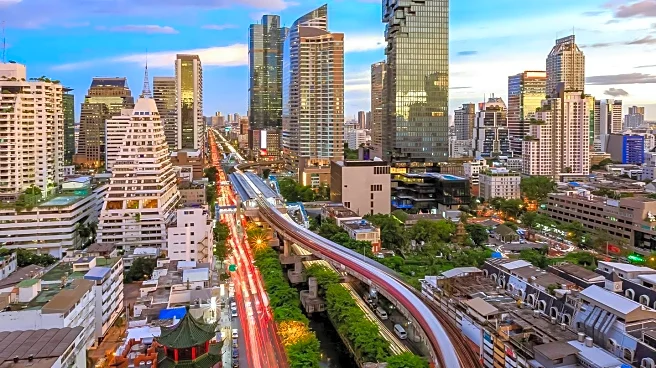What's Happening?
Thailand is experiencing significant disruptions in mass transit due to severe flooding affecting over 480,000 people across 13 provinces, particularly in the north and central regions. The floods have
resulted from the Tha Chin River breaching its banks, causing widespread transportation delays and service interruptions. In Nakhon Pathom province, a unique situation has arisen where a riverside restaurant has become an internet sensation, attracting customers to dine amidst floodwaters filled with live fish. This unusual dining experience has drawn people from various areas, eager to enjoy meals while surrounded by fish swimming in the aisles. Despite the novelty, the floods have had devastating effects elsewhere, with 12 fatalities and two missing persons reported since late July.
Why It's Important?
The flooding in Thailand highlights the vulnerability of infrastructure to natural disasters, impacting daily life and economic activities. The mass transit disruptions can lead to significant economic losses, affecting businesses and individuals reliant on transportation networks. The situation underscores the need for improved flood management and infrastructure resilience to mitigate future disruptions. While the restaurant's unique dining experience has boosted its business, doubling profits, the broader impact on affected regions is severe, with many communities facing hardships. The floods serve as a reminder of the importance of disaster preparedness and the potential consequences of climate-related events on society and the economy.
What's Next?
As high tides and the monsoon season continue, Thailand can expect further inundation in affected areas. Authorities may need to implement additional measures to manage the floodwaters and support affected communities. The ongoing situation could prompt discussions on enhancing flood prevention strategies and infrastructure improvements to better withstand future events. Stakeholders, including government agencies and civil society groups, may advocate for increased investment in disaster resilience and climate adaptation initiatives. The focus will likely be on minimizing disruptions and ensuring the safety and well-being of residents in flood-prone regions.
Beyond the Headlines
The flooding in Thailand raises ethical and environmental considerations regarding urban planning and development in flood-prone areas. It highlights the need for sustainable practices that prioritize ecological balance and community safety. The situation also reflects cultural aspects, as the restaurant's popularity demonstrates how communities adapt and find unique ways to cope with natural challenges. Long-term shifts may include increased awareness and advocacy for climate action, emphasizing the importance of integrating environmental considerations into policy-making and urban development.










